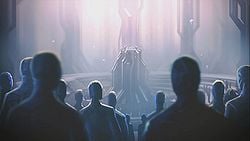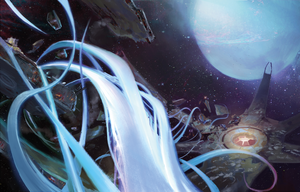Forerunner-Flood war: Difference between revisions
From Halopedia, the Halo wiki
BaconShelf (talk | contribs) m (→Endgame) |
Covenant PhD (talk | contribs) No edit summary |
||
| Line 55: | Line 55: | ||
{{Quote|A hundred thousand years ago, a [[Ecumene|great civilization]] existed in this universe. Like all great civilizations, they faced a sudden and dire turn of events. A threat to their primacy from ''outside''. Something they never expected, never prepared for... a deeply alien threat they called simply the [[Flood]].|[[Cortana]]<ref name="origins">'''[[Halo Legends]]''' - ''[[Origins]]''</ref>}} | {{Quote|A hundred thousand years ago, a [[Ecumene|great civilization]] existed in this universe. Like all great civilizations, they faced a sudden and dire turn of events. A threat to their primacy from ''outside''. Something they never expected, never prepared for... a deeply alien threat they called simply the [[Flood]].|[[Cortana]]<ref name="origins">'''[[Halo Legends]]''' - ''[[Origins]]''</ref>}} | ||
The '''Forerunner-Flood war''' was a pivotal galactic conflict that occurred between the [[Forerunner]]s and the [[Flood]] parasite. It was started on [[Seaward|G617 g1]] around [[97,745 BCE]] and lasted approximately three centuries. The Forerunners concluded the war in [[97,445 BCE]] with the activation of the [[Halo Array]], seven superweapons that purged the galaxy of all [[Sentience|sentient]] life in order to stop the Flood. The conflict ended the Forerunners' eons-long rule in the galaxy; most of their [[ecumene]] having fallen to the Flood, the few remaining members of the species went into exile after completing the [[Reintroduction|repopulation]] of the galaxy's sentient species from specimens [[Conservation Measure|preserved]] at [[Installation 00|the Ark]]. | The '''Forerunner-Flood war''' was a pivotal galactic conflict that occurred between the [[Forerunner]]s and the [[Flood]] parasite. It was started on [[Seaward|G617 g1]] around [[97,745 BCE]] and lasted approximately three centuries. The Forerunners concluded the war in [[97,445 BCE]] with the creation and activation of the [[Halo Array]], seven superweapons that [[Great Purification|purged the galaxy]] of all [[Sentience|sentient]] life in order to stop the Flood. The conflict ended the Forerunners' eons-long rule in the galaxy; most of their [[ecumene]] having fallen to the Flood, the few remaining members of the species went into exile after completing the [[Reintroduction|repopulation]] of the galaxy's sentient species from specimens [[Conservation Measure|preserved]] at [[Installation 00|the Ark]]. | ||
==Prelude== | ==Prelude== | ||
Revision as of 13:41, September 13, 2019
- "A hundred thousand years ago, a great civilization existed in this universe. Like all great civilizations, they faced a sudden and dire turn of events. A threat to their primacy from outside. Something they never expected, never prepared for... a deeply alien threat they called simply the Flood."
- — Cortana[1]
The Forerunner-Flood war was a pivotal galactic conflict that occurred between the Forerunners and the Flood parasite. It was started on G617 g1 around 97,745 BCE and lasted approximately three centuries. The Forerunners concluded the war in 97,445 BCE with the creation and activation of the Halo Array, seven superweapons that purged the galaxy of all sentient life in order to stop the Flood. The conflict ended the Forerunners' eons-long rule in the galaxy; most of their ecumene having fallen to the Flood, the few remaining members of the species went into exile after completing the repopulation of the galaxy's sentient species from specimens preserved at the Ark.
Prelude
The Forerunners were an ancient race who thrived as the dominant civilization in the Milky Way galaxy, organizing their ecumene over millions of terrestrial planets. They derived their authority from the Mantle, their pledge to watch over and preserve all life in the galaxy. The Forerunners' society was based on caste-like strata known as rates, with a dedicated military class which included both naval elements and ground forces. Their technological capacity was without equal, in areas such as the understanding of slipspace, energy manipulation, artificial intelligence and astroengineering. They measured technological advancement in a succession of Tiers.[2]
While powerful, the Forerunners were not the only major civilization in the galaxy. Other races with interstellar empires included prehistoric humanity, who had allied with the early San'Shyuum. Around 107,445 BCE, the Flood emerged as a threat within the humans' territory, supposedly having entered the galaxy from one of the Magellanic Clouds. The infection caught the humans and San'Shyuum by surprise, infecting their populations and taking their worlds at a steady rate. At a certain point during the conflict, however, the Flood stopped infecting humans altogether and began to recede from the galaxy. Although widely believed to be the result of a cure created by humanity,[3] this retreat was in fact due to the Flood's own long-term strategy to bring ruin to the Forerunners.[4]
Unknown to the Forerunners at this time, the Flood was actually a manifestation of the Precursors, a race of incredibly powerful beings who seeded the galaxy with life. Ten million years earlier, the Forerunners had rebelled against the Precursors and driven them to extinction; those who survived transmuted themselves to a molecular powder, meant to regenerate the Precursors at a later time. When biological beings came into contact with this powder—corrupted over millions of years—it manifested itself as a parasitic lifeform; the earliest stage of the Flood. Far from accepting defeat and extinction, the Precursors decided to wield their new form as an instrument to exact their revenge on the Forerunners for their crimes, and to bring unity to all life.[5]
The Forerunners first encountered the Flood during this conflict, witnessing its frightening power firsthand. Even at its withering state, the Flood proved to be a potent threat, infesting hundreds of Forerunner fleets before the Warriors adopted a policy of total extermination, destroying all traces of the Flood wherever they were found.[6] Combined with the humans and San'Shyuum practicing a similar strategy for several centuries, no trace of the Flood seemingly remained in the galaxy afterward.[7]
While quelled for a time, the threat of the Flood would shape Forerunner politics for millennia to come. Two major factions emerged in the Forerunner political scene with differing views on how to best prepare against the parasite's return. A series of devastating superweapons, known as Halos, was created by the Builders while the Prometheans, led by the Didact, devised a more strategic defense solution consisting of numerous military installations known as Shield Worlds. However, the Prometheans eventually lost to the Builders and were forced into exile, securing Master Builder Faber's position in the Ecumene Council's favor for over a thousand years. This infighting eroded the Forerunners from within, making them more vulnerable against the Flood's second wave.[7]
Aware of the inevitability of the return of the Flood threat, the Lifeworkers led by the Librarian began indexing and protecting species across the galaxy. The Halos and their extragalactic construction facilities—Arks—were constructed with this Conservation Measure in mind, designed to house artificial ecosystems and countless sentient species, a means to partially undo the damage on galactic life in the event the Halos were used.[7] Due to its colossal scale, this indexing and preservation project would last all the way until the end of the conflict with the Flood, and even then failed to save even remotely all of the galaxy's sentient life.[8]
After over nine thousand years, the Flood returned, contesting the Forerunners for control of the entire galaxy. While the Flood sought to assimilate all sentient life, the Forerunners attempted to defend against the Flood threat using several measures to both directly combat them as well as carry out research in regards to the parasite's capabilities.[1]
The war
Beginning
- "It devoured everything it touched. At first, their technology, their courage seemed like it might prevail. But they waited too long to see the threat, to join the fight. The Flood had spread too far and too wide."
- — Cortana on the Forerunner-Flood war.
After nearly ten thousand years of absence, the Flood reappeared on the planet G617 g1, a lightly inhabited world harboring a small commune of Forerunners. The Flood initially caught the Forerunner military by surprise, using captured non-military vessels to penetrate local Forerunner naval blockades to descend and land upon Forerunner-colonized worlds, overrunning local defenses and converting billions of Forerunners per world with hundreds of millions of Flood forms. Eventually, Forerunner fleets were forced to commence orbital bombardment on Flood-infested worlds to prevent the Flood's spread to other planets.[9]
Stalemate
- "Know that a thousand other plans were tried and failed. Millions of brave and honored souls died trying to avert this terrible, desperate situation."
- — A Forerunner log describing the situation the Forerunners found themselves in.[10]
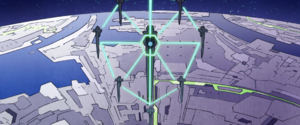
As the Flood grew in number and became more intelligent in the process, the Forerunners identified a centralized intelligence coordinating their efforts: the Gravemind, the consciousness of the Flood itself, embodied in agglomerated collectives of biomass and in the millions of Flood forms.[2] Using attrition tactics, the Flood gradually weakened the most formidable Forerunner naval countermeasures, one of which consisted of using Keyships and drawing the Flood into pricey naval engagements. However, even Forerunner commanders realized that their naval tactics were being overcome, and a new solution was necessary if the Forerunners were to pull of out this stalemate.[9]
The highest levels and tiers of the Forerunner Fleet Command began to realize that Forerunner species' extinction was plausible at the Flood's discretion as so many Forerunners had fallen victim to the Flood. As the Flood continued to spread, planetary self-bombardment after Flood infestation turned into complete system-wide destruction by detonating planetary system stars after a large Flood presence was detected in a Forerunner system. Forerunner military forces were ordered to don heavy armor and other personnel were ordered into protective stasis.[9] Flood were taken into M-type installations and studied in an effort to find yet another countermeasure.[2]
Hundreds of other unsuccessful methods were attempted by the Forerunners to overcome the Flood.[10] Among these failed plans was the use of the Composer, a machine designed to circumvent Flood infection by translating an organic being's mental pattern into data and then transferring that pattern over an artificial body devoid of Flood infection. Unfortunately, this process proved to be flawed—all infected Forerunners treated with the Composer succumbed to decay and gruesome death.[11] While galaxy-wide sterilization using the Halo rings existed as an option, the Forerunners would not resort to the Halos until the very end, viewing them as contrary to their Mantle to protect life.
On a larger scale, the Forerunners were relatively successful in keeping the Flood threat contained during the initial stalemate, lasting nearly three hundred years: no more than twelve outer systems were lost over this period.[12] For a significant amount of time, the Forerunner government managed to suppress information on the Flood threat, keeping its true nature hidden from the general populace of their core systems to avoid panic; the Flood was publicly claimed to be a mutation-inducing disease caused by stellar radiation.[13] However, during the stalemate, the Flood was secretly readying for an attack.[9]
Crisis
- "I kill you all and I enjoy it. I destroy you in your indolent billions—in your gluttony, in your self-righteousness, in your arrogance. I pound your cities into dust; turn back the clock on your civilization's progress. What has taken you millennia to achieve I erase in seconds. Welcome back to the [Stone Age], vermin. Welcome home."
- — An excerpt of Mendicant Bias' hate-fueled diatribe against the Forerunners after the AI's defection to the Flood.[9]
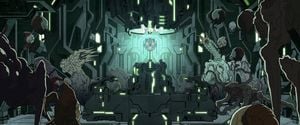
The Forerunners had created a powerful Contender-class artificial intelligence known as Mendicant Bias, and tasked it with leading all of their defensive efforts. Mendicant had deployed major fragments of itself on numerous warships as well as all of the twelve installations of the original Halo Array. Around 97,495 BCE, Mendicant Bias was charged with the first test-firing of a Halo, Installation 07, near the former Precursor world of Charum Hakkor. As a result of this small-scale activation, an ancient entity imprisoned on Charum Hakkor, known as the Primordial, was released and subsequently transported to Installation 07 for study. Master Builder Faber tasked Mendicant Bias with interrogating the Primordial before having Installation 07 moved to a hidden locale to conduct his own unsanctioned experiments in secret.[14] During its 43-year long discourse with the Primordial, Mendicant Bias was convinced by the entity, actually a Gravemind, to turn against its Forerunner masters.[15]
Around the same time, Faber used Installation 07 to suppress a San'Shyuum insurrection, practically wiping out the species aside from samples indexed by the Librarian. The Ecumene Council deemed this a severe violation against the Mantle. The remaining Halo rings were to be brought to the Capital and were slated to be decommissioned, as they were deemed too destructive. This turned out to be a miscalculation on the Forerunners' part, as the rampant Mendicant Bias would arrive aboard Installation 07 and take control of many of the Halo rings over the capital.[16] Despite heavy resistance from the Forerunner fleets, Mendicant Bias successfully fired Installation 07 in the Capital system, delivering a catastrophic blow to the Forerunner leadership for a time.[15]
While the Forerunner government had downplayed the Flood threat up until this point,[13] they were now forced to take more drastic measures in order to survive. The Ecumene Council remained in disarray after Mendicant Bias' attack. The Ur-Didact had only recently returned from a millennium of exile, but the Master Builder, before being removed from power, had managed to capture the Didact and abandon him in a Flood-infested region of the galaxy. However, the Didact had duplicated his essence to another body, creating a secondary incarnation of himself, known as the IsoDidact. This copy assumed the role of the original Didact and reassumed command of the Forerunner military. Hoping to defeat the Flood via conventional strategy, the IsoDidact reactivated his shield worlds and the defense plan he had engineered thousands of years earlier.[17][18] The Forerunners scored a temporary victory as the IsoDidact's forces reclaimed Installation 07 and captured the rampant Mendicant Bias. The Ecumene Council, which had been crippled by Mendicant Bias' attack, was reinstated shortly afterward as the "New Council".[19]
Final years
The Forerunners' victory was short-lived; Mendicant Bias' defection and subsequent decapitating strike on the Old Council had marked a turning point in the course of the war. What had been a steadily growing but relatively contained infestation now rapidly exploded beyond hope of control. Using vessels and forces operated by both corrupted biologicals and AIs, supposedly marshaled during the decades Mendicant Bias and Installation 07 were missing, the Flood began to strike critical Forerunner systems in overwhelming numbers. Due to the Forerunners' previous cover-up of the Flood threat, subverted forces were initially welcomed in many systems left unaware of their true nature. Two thousand systems were rapidly infected, becoming home to Flood hives.[20] Undeterred the Flood continued to spread; with the Forerunner defenses unable to stop the Flood's advance, over 500,000 star systems were infected by the Flood. The Flood soon controlled two-thirds of the ecumene; these areas were referred to as Burns.[21]
When the Flood threat began to spiral out of control, the Forerunners resorted to an ancient defensive barrier; the Jat-Krula, often translated as the "Maginot Line", which protected their core systems within the Orion complex. The Forerunner leadership decided to focus on the preservation of the systems within the Line while leaving the rest of the ecumene to fend for themselves.[22] The Forerunners mostly succeeded in holding the Flood at bay at this barrier before the very end of the war, although the Flood managed to breach the Line in several locations.[23] The Forerunner Librarian and her Lifeworkers journeyed beyond this line at great personal risk, continuing their mission of indexing and documenting sentient species across the galaxy, filling every vessel possible with documented species for transit to the Ark for safety in the campaign to save all species possible from the advancing Flood.[9] Over a period of four years, the IsoDidact commanded Forerunner defense operations from within the Line, leading forces combined from Warrior-Servants and Builder Security.[24]
Although Mendicant Bias had been disassembled and scattered across the ecumene, the facilities in which the disparate parts of the metarch were held were eventually overrun by the Flood and Mendicant was soon reconstituted as the commander of the Flood's fleets.[25] Furthermore, as the Flood gained more biomass, it continued to develop into more potent and dangerous forms; massive compound mind nodes known as Key Minds were formed as entire planets were assimilated. The raw computing power of these enormous collectives could outwit even the most advanced Forerunner AIs.[26]
The Flood became more virulent as the infection took up more aspects; the most prominent of these was the logic plague, the ability to subvert and corrupt Forerunner artificial intelligences. This metaphysical form of corruption could eventually be perpetuated by any Flood form or infected AI, and rapidly spread across the Forerunners' data networks. The Forerunner Juridicals were forced to halt all legal proceedings as their principal network and many of their primary agents—Catalog—were overtaken by the logic plague.[27] Even in the final years of the war, the Forerunners were determined to salvage infested vessels and purge them of both biological and software infection wherever possible; only a minute fraction of these attempts were ultimately successful, eventually resulting in the Forerunners terminating these efforts completely and opting for complete destruction of all infected ships.[27]
In this late stage of the war, the Flood became powerful enough to use neural physics-based technology, allowing them to take control of the numerous Precursor artifacts, such as star roads, that had lain dormant across the galaxy for millions of years. The Forerunners did not possess any formidable defense against the sheer power and destructive capability of the Precursor constructs, which were capable of effortlessly dealing widespread devastation on entire Forerunner fleets. After disabling their weapons and shields, the star roads corralled Forerunner vessels into smaller units to allow their crews to be parasitized by the Flood. Less than one half of one percent of Forerunner vessels attacked this way were able to self-destruct before they were overwhelmed.[27] The Precursor constructs were also capable of manipulating space-time to become unsuitable for Forerunner slipspace travel and leaving entire fleets stranded or lost in anomalous slipspace transit.[28] During this time, entire planets such as Triniel committed planet-wide mass suicide to deprive the Flood access to their biomass as potential hosts. The Flood would then leave the dead world untouched as there was nothing of interest on the planet for them despite entire Forerunner cities being left intact.[29]
Endgame
- "We seek security in the Domain and the example of the Mantle. We who are about to kill seek forgiveness. We treasure the truth of our error, that in future error will pass from us, and from the lives of all who come after."
- — Faber, the Master Builder, chanting before unleashing Omega Halo on Path Kethona.[30]
Having evacuated the remaining Forerunner population to safety, Forerunner fleets were repositioned to defend a region of four themas, nearly overrun by the Flood. Despite attaining a rare victory at the 78th Thema, the Forerunners continued to lose ground in most engagements. All surviving vessels from the last Forerunner fleets were eventually assigned under the command of the metarch-class AI Offensive Bias, designed to replace and counter the rampant Mendicant Bias.[31] In a decisive last stand beyond Jad Sappar, the last combined Forerunner fleet faced massive swarms of infested ships, supported by thousands of star roads.[32]
With the defenses of the Capital and the entire Orion complex failing and the Forerunner fleets across the galaxy being steadily ravaged by the Flood, strategic command of the ecumene was placed in the greater Ark,[27] which eventually held the last remnants of the ecumene aside from minor pockets of survivors across the galaxy.[33] The Librarian's biological specimens—including her core human population—once held on the Ark's surface were moved to the nearby Omega Halo, which, along with Installation 07, was the last of the Master Builder's original Halos.[34] A handful of Forerunner military commanders survived to retreat to the greater Ark, managing to bring a small number of warships with them to defend what was now the ecumene's last bastion.[35]
The remaining Forerunner leadership gathered at the greater Ark, including the Ur-Didact, who had been recovered from deep within the Burn by the Master Builder. Soon after their arrival, the Ark came under siege by Mendicant Bias and its fleet of Flood-controlled ships and star roads. Out of desperation, the remnants of the Council restored the Master Builder to command, as he was the only one with a realistic vision on how to stop the Flood: the Halo Array, which targeted all neural structures—including the Flood and their Precursor structures, thus capable of stopping them once and for all. While this was true, it was too little, too late, and he knew this better than anyone: he revealed the location of the lesser Ark to the IsoDidact and ordered him there.[36]
The penultimate battle of the Forerunners was bitterly short: Omega Halo's primary weapon, having never been upgraded, could only fire in one direction and it was able to fire only once, tearing a hole in the approaching Flood wave and striking the Large Magellanic Cloud; while seemingly devastating, the Flood paused only momentarily to restore their line. Further delayed only slightly by the desperate defense offered by Offensive Bias, Mendicant Bias and the Flood fleet destroyed Omega Halo and the greater Ark, along with most of the Forerunner fleet.[37]
In the chaos just before the battle was joined, the Ur-Didact—who had been driven mad by the Gravemind—used a Composer to harvest the essences of the entire human population of Omega Halo, much to the horror of the Librarian who had placed all of her hope in humanity. The Didact planned to use the essences of both the humans and his own Prometheans to build an army of mechanical warriors, which he believed could fight an extended campaign against the Flood. This was a grave transgression in the eyes of the Librarian, who had already laid plans for humanity as the successors to the Forerunners. In order to stop the Ur-Didact, the Librarian forcibly incapacitated him and imprisoned him within the shield world Requiem.[38]
Firing of Halo
- Main article: Great Purification
- "Something is wrong...at night I can see it--flitting shadows--black against the stars. Thousands of ships! Not spiraling outward, but heading for the line! This is the tipping point, Didact. It's no longer feeding. It's coming for you."
- — The Librarian to the IsoDidact.[9]
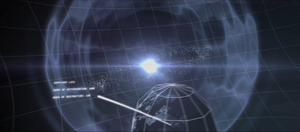
The IsoDidact (rescued from the destruction of Omega Halo by Monitor Chakas), Offensive Bias, and the remaining Forerunners headed to the lesser Ark, along with the surviving biological specimens from the greater Ark. This formerly secret installation contained the Forerunners' final weapon: the newer Halo Array, which would purge the galaxy of sentient life, depriving the Flood of all biomass that they could consume, thus halting them. The seven rings were deployed in their designated locations across the galaxy, and while the firing preparations were being conducted, Mendicant Bias and the Flood prepared to assault the Ark. In order to give the IsoDidact time to fire the rings, the Librarian journeyed to Earth, broadcasting a feint message to draw the Flood there. Ignoring the IsoDidact's pleas to return to the Ark, the Librarian calmly embraced her inevitable demise in the savanna near Mount Kilimanjaro, overlooking the construction of the Portal to the Ark.[9]
To ensure enough time for the Halo Array to fire, the IsoDidact ordered Offensive Bias and all that remained of the Forerunner fleets to delay Mendicant Bias' fleet.[39] While the IsoDidact initiated the Halo Array's activation sequence, the Flood fleet engaged the last Forerunner fleet in a massive naval battle. Feigning incompetence and using delaying tactics, Offensive Bias and his fleet held off the Flood as the Halos activated, exterminating all sentient life in the Milky Way galaxy. With the previously Flood-controlled ships now adrift, Offensive Bias annihilated Mendicant's remaining fleet within minutes. Offensive then proceeded to extract the last remaining shard of Mendicant Bias from one of its core ships and return it to the lesser Ark.[9]
Aftermath
The Halo effect purged the galaxy of all sentient life, eliminating the threat of the Flood as it was deprived of available biomass and its collective consciousness. All Precursor artifacts and structures, composed of abstract neural physics construction, were likewise destroyed. These included the Domain, a metaphysical repository of knowledge treasured by the Forerunners as the source of all their cultural heritage and ancestral wisdom.[40]
The surviving Forerunners on the Ark, under the leadership of the IsoDidact, imprisoned what was thought to be the last component of Mendicant Bias deep within Installation 00.[41] The lifeforms sheltered on the Ark were eventually returned to their homeworlds and reintroduced to their native ecosystems, now free of the Flood, by the remaining Forerunners and their automatons; this process was led by the new Lifeshaper, Chant-to-Green.[42]
Despite the Lifeworkers' best efforts, the firing of the Halos resulted in mass extinction events on countless worlds across the galaxy; most prominently those the Forerunners had never had the time or resources to index. On many planets, Lifeworkers had to prioritize which species to save; for example, it was estimated that only one-thousandth of Earth's large species would survive.[8] Around four years before the firing of the Halos, 123 technologically capable species had been indexed; however, a number of these were doomed to perish due to the Lifeworkers' limited resources,[43] combined with the devastation of the preserves on the greater Ark and Omega Halo. Many species also died out as a result of planetary ecosystems failing to properly recover after their reseeding, during the subsequent period known as the dark time.[2]
After this reseeding effort was finished the surviving Forerunners left the galaxy,[44] vowing to exclude themselves from the affairs of other species out of guilt over their failure as galactic custodians.[42] The Forerunners left the Mantle for humanity to reclaim[45] as the Precursors had intended millions of years earlier.[5]
Gallery
- Forerunner weapon.jpg
Forerunner combatants facing a horde of Flood.
List of appearances
- Halo 2 (First mentioned)
- Iris (Mentioned only)
- Halo 3
- Terminals (Mentioned only)
- Halo Legends
- Origins (First appearance)
- Halo: Cryptum
- Halo: Combat Evolved Anniversary
- Halo: Primordium
- Halo 4
- Halo: Silentium
- Halo: Rebirth (Indirect mention)
- Halo: Broken Circle (Mentioned only)
- Halo: Last Light (Mentioned only)
- Halo 5: Guardians (Mentioned only)
- Halo Mythos
- Halo: Fractures
- Promises to Keep (Mentioned only)
- Defender of the Storm
- Halo Wars 2 (Mentioned only)
- Halo: Renegades (Mentioned only)
Sources
- ^ a b Halo Legends - Origins
- ^ a b c d Bestiarum
- ^ Halo: Silentium, page 37
- ^ Halo: Primordium, page 364
- ^ a b Halo: Silentium, pages 173-175
- ^ Halo: Silentium, page 36
- ^ a b c Halo: Cryptum, "Chapter 34"
- ^ a b Halo: Silentium, page 27
- ^ a b c d e f g h i Halo 3, Terminals
- ^ a b Iris, Episode 1
- ^ Halo: Silentium, page 40
- ^ Halo: Cryptum, page 244
- ^ a b Halo: Cryptum, page 235
- ^ Halo: Cryptum, "Chapter 39"
- ^ a b Halo: Primordium, page 272
- ^ Halo: Cryptum, "Chapter 37"
- ^ Halo: Cryptum, page 250
- ^ Halo: Cryptum, page 341
- ^ Halo: Primordium, page 374-375
- ^ Halo: Silentium, pages 183-184
- ^ Halo: Silentium, String 20
- ^ Halo: Silentium, pages 104-105
- ^ Halo: Silentium, page 193
- ^ Halo: Silentium, page 197
- ^ Halo: Silentium, pages 267-268
- ^ Halo: Silentium, pages 186-187
- ^ a b c d Halo: Silentium, pages 214-215
- ^ Halo: Silentium, pages 235-236
- ^ Halo: Renegades, pages 202-203
- ^ Halo: Silentium, page 271
- ^ Halo: Silentium, page 215
- ^ Halo: Silentium, pages 222-223
- ^ Halo: Silentium, page 327
- ^ Halo: Silentium, pages 237-238
- ^ Halo: Silentium, page 245
- ^ Halo: Silentium, String 29
- ^ Halo: Silentium, String 33
- ^ Halo 4, Terminals
- ^ Halo: Silentium, String 38
- ^ Halo: Silentium, pages 322-323
- ^ The Trial of Mendicant Bias
- ^ a b Halo: Rebirth
- ^ Halo: Silentium, page 18
- ^ Halo Encyclopedia, pages 16, 28, 171, and 289
- ^ Halo 4, campaign level Reclaimer
| ||||||||||||||
